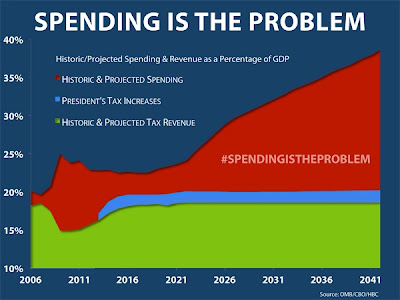With over $16 trillion in national debt and trillion dollar deficits every year for the last four years, it takes a person that is truly blind to reality, deaf to "we the people" and dumber than a stump to say "We don't have a spending problem."
What stunned House Speaker John Boehner more than anything else during his prolonged closed-door budget negotiations with Barack Obama was this revelation: "At one point several weeks ago," Mr. Boehner says, "the president said to me, 'We don't have a spending problem.' "
In October 2012, as with every poll conducted before that, another poll found that 79 percent of Americans felt that the cause of the federal debt comes from government spending being too high.
That was October 2012, but even as recently as five days ago, polling found that 62 percent of voters favor across the board spending cuts. (Via The Hill)
Typical, everyday Americans, those who are not ideologues or political junkies, have a better understanding of the nation's spending problem than Barack Obama does.
The president's insistence that Washington doesn't have a spending problem, Mr. Boehner says, is predicated on the belief that massive federal deficits stem from what Mr. Obama called "a health-care problem." Mr. Boehner says that after he recovered from his astonishment—"They blame all of the fiscal woes on our health-care system"—he replied: "Clearly we have a health-care problem, which is about to get worse with ObamaCare. But, Mr. President, we have a very serious spending problem." He repeated this message so often, he says, that toward the end of the negotiations, the president became irritated and said: "I'm getting tired of hearing you say that."
That goes beyond the so-called presidential bubble, where presidents are surrounded by yes men that only tell him what he wants to hear. This is Obama blatantly ignoring the spending problem, hoping if he doesn't acknowledge it, it will simply go away.
Washington Post Fact Checker points to the Standard & Poor’s report on why it reduced the nation’s debt rating after the 2011 deal that ended the last conflict over the debt ceiling. The report offered two key reasons:
The question now becomes what can the House of Representatives, which is controlled by the GOP, do in the face of the Senate and White House being controlled by Democrats that refuse to acknowledge Washington has a spending problem.1) “The downgrade reflects our opinion that the fiscal consolidation plan that Congress and the Administration recently agreed to falls short of what, in our view, would be necessary to stabilize the government's medium-term debt dynamics.”2) “More broadly, the downgrade reflects our view that the effectiveness, stability, and predictability of American policymaking and political institutions have weakened at a time of ongoing fiscal and economic challenges to a degree more than we envisioned when we assigned a negative outlook to the rating on April 18, 2011.”As part of its analysis, S&P assumed Republicans in Congress would never agree to raise taxes, but that actually happened as part of the “fiscal cliff’ negotiations. But S&P was also worried Congress would not fulfill the second half of promised spending cuts — and those have now been deferred for two months.
In any case, S&P was clearly looking for more signs of cooperation on restraining the debt....
Boehner addresses that:
As Mr. Boehner tells the story: Mr. Obama was sure Republicans would call for ending the sequester—the other "cliff"—because it included deep defense cuts. But Republicans never raised the issue. "It wasn't until literally last week that the White House brought up replacing the sequester," Mr. Boehner says. "They said, 'We can't have the sequester.' They were always counting on us to bring this to the table."
Mr. Boehner says he has significant Republican support, including GOP defense hawks, on his side for letting the sequester do its work. "I got that in my back pocket," the speaker says. He is counting on the president's liberal base putting pressure on him when cherished domestic programs face the sequester's sharp knife. Republican willingness to support the sequester, Mr. Boehner says, is "as much leverage as we're going to get."
Just as taxes were automatically going up on every American if Congress and the White House didn't come to a fiscal deal, now certain tax cuts were made permanent.
What is left in two months are automatic spending cuts which Democrats are frantic to stop, but without the willingness to deal, compromise and offer other spending cuts to replace them, they have no hand.


